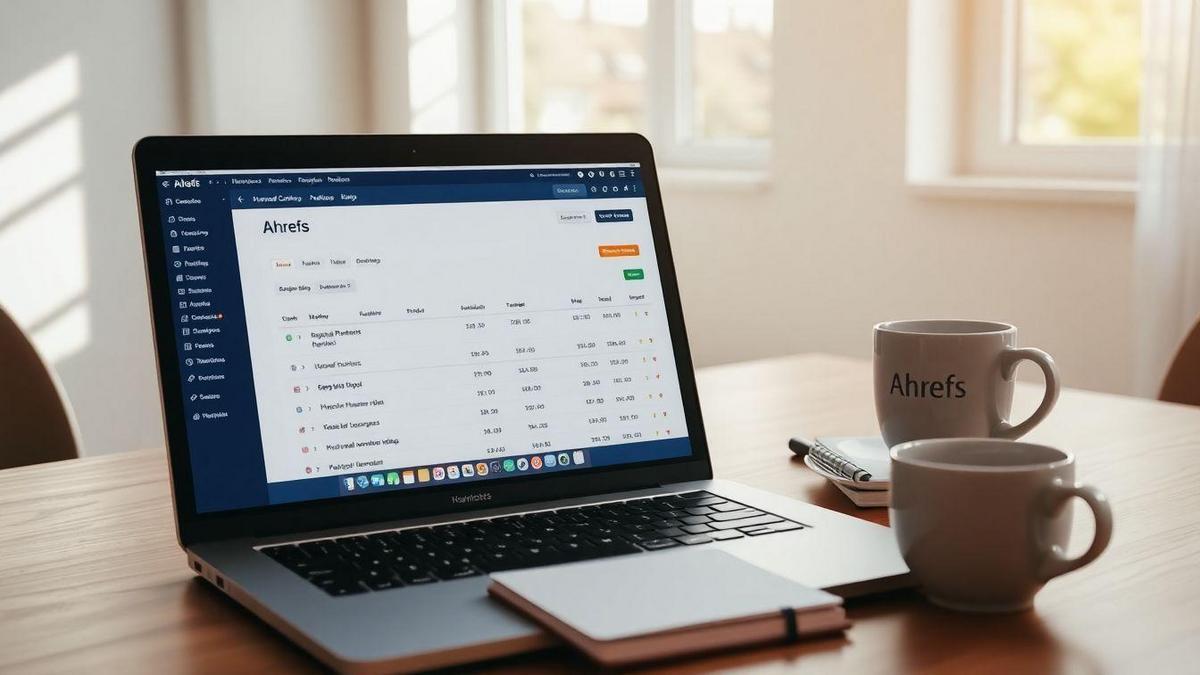Are you curious how to use Ahrefs for keyword research? You’re in the right place! This article will walk you through everything you need to know about Ahrefs Keyword Explorer. From navigating its features to understanding the impact of keywords on your website, we’re covering it all. Get ready to unlock the full potential of Ahrefs and boost your SEO game!

Understanding Ahrefs Keyword Explorer
What is Ahrefs Keyword Explorer?
Ahrefs Keyword Explorer is a powerful tool that helps you find the best keywords for your website. It’s like having a treasure map that leads you to the right words people are searching for. Whether you’re a blogger, a business owner, or just someone curious about SEO, this tool can help you discover keywords that can drive traffic to your site.
Key Features of Ahrefs Keyword Explorer
Ahrefs Keyword Explorer comes packed with features that make your keyword research easier. Here are some of the key features:
| Feature | Description |
|---|---|
| Search Volume | Shows how many people are searching for a keyword each month. |
| Keyword Difficulty | Indicates how hard it is to rank for a keyword. |
| Clicks | Estimates how many clicks you might get from the search results. |
| Related Keywords | Provides a list of similar keywords you might want to consider. |
| SERP Overview | Displays the top-ranking pages for a keyword and their stats. |
How to Navigate the Ahrefs Keyword Explorer
Navigating Ahrefs Keyword Explorer is straightforward. Here’s how you can get started:
- Log In: First, log into your Ahrefs account.
- Select Keyword Explorer: Click on the Keyword Explorer option from the dashboard.
- Enter Your Keyword: Type in the keyword you want to research.
- Analyze the Results: Once you hit search, you’ll see a wealth of data. Look at the search volume, keyword difficulty, and other metrics to decide if it’s a good keyword for you.
- Explore Related Keywords: Don’t forget to check out the related keywords section. This can lead you to more opportunities!
By using Ahrefs Keyword Explorer, you can find the right keywords that can help your content shine and attract more visitors.
The Importance of Keyword Research
Why Keyword Research Matters for SEO
When you think about SEO, keyword research is like laying the foundation for a house. If you don’t get it right, everything else can crumble. You want to know what your audience is searching for. This helps you create content that speaks directly to their needs.
Imagine you’re trying to sell lemonade. If you know people are looking for “refreshing summer drinks,” you can tailor your lemonade recipe and marketing to match that search. Keyword research helps you find those phrases that people use, so your content can pop up right when they need it.
How Keywords Impact Your Website Traffic
Keywords are the road signs that guide users to your site. When you use the right keywords, you can increase your website traffic significantly. Think of it this way: if you write a blog post about “best summer drinks,” but no one is searching for that exact phrase, your post may get buried under a mountain of other content.
Here’s a quick table to illustrate how keyword choices can affect traffic:
| Keyword Phrase | Monthly Searches | Competition Level |
|---|---|---|
| Refreshing summer drinks | 5,000 | Low |
| Best summer drinks | 20,000 | High |
| Lemonade recipes | 15,000 | Medium |
Using the right keywords can lead to more eyes on your content, which is what every website owner dreams of.
The Role of Keywords in Content Strategy
Keywords play a crucial role in shaping your content strategy. They help you decide what to write about and how to structure your posts. By focusing on the right keywords, you can create content that not only attracts visitors but also keeps them engaged.
For example, if you’re writing about “How to Use Ahrefs for Keyword Research,” you can break it down into sections like:
- Understanding Ahrefs: What it is and why it’s useful.
- Finding Keywords: How to search for keywords using Ahrefs.
- Analyzing Keywords: What the data means and how to use it.
This approach not only makes your content organized but also ensures that you’re addressing the questions your audience has.

How to Find Keywords Using Ahrefs
Steps to Conduct Keyword Research with Ahrefs
Finding the right keywords is crucial for your SEO strategy. Ahrefs makes this process easier. Here’s how you can do it:
- Sign Up for Ahrefs: If you don’t have an account, create one. They offer a trial, so you can test the waters.
- Go to the Keywords Explorer: Once you’re in, click on the “Keywords Explorer” tab. This is where the magic happens.
- Enter Your Seed Keyword: Type in a keyword related to your niche. For example, if you’re into gardening, you might use “best plants for beginners.”
- Choose Your Target Location: Select the country or region you want to target. This helps you get relevant results.
- Hit Search: Click on the search button, and let Ahrefs do its thing. You’ll get a treasure trove of keyword ideas!
Tips for Finding Long-Tail Keywords in Ahrefs
Long-tail keywords are your best friends. They may have lower search volumes, but they often convert better. Here’s how to find them:
- Use the “Phrase Match” Report: After searching your seed keyword, look for the “Phrase Match” report. This will show you longer phrases that include your keyword.
- Check Out the “Questions” Section: People often ask questions related to your topic. This section gives you great ideas for long-tail keywords.
- Look for Low Keyword Difficulty: Focus on keywords that are easier to rank for. Ahrefs shows you the keyword difficulty score, so you can pick wisely.
Best Practices for Keyword Selection
When selecting keywords, keep these tips in mind:
| Tip | Explanation |
|---|---|
| Focus on Relevance | Choose keywords that closely relate to your content. |
| Consider Search Intent | Think about what users want when they search for those keywords. |
| Balance Between Volume and Difficulty | Aim for keywords with decent search volume but lower competition. |
By following these steps and tips, you’ll be well on your way to mastering how to use Ahrefs for keyword research!
Analyzing Competitors with Ahrefs
How to Perform Competitive Keyword Analysis in Ahrefs
When you’re diving into SEO, understanding what your competitors are doing is key. Ahrefs is a powerful tool that helps you do just that. To kick things off, you’ll want to enter your competitor’s website into the Ahrefs Site Explorer. Here’s how to get started:
- Enter the URL of your competitor’s site.
- Click on the “Organic Keywords” tab. This shows you what keywords they rank for.
- You can filter this data by position, traffic, or keyword difficulty. This way, you can focus on what matters most to you.
This process gives you a clear picture of which keywords are driving traffic to your competitor’s site. It’s like peeking at their playbook!
Finding Gaps in Competitors’ Keyword Strategies
Now that you know what keywords your competitors are using, it’s time to find those gaps. These are the keywords they might be missing, and you can swoop in and grab them! Here’s how to do it:
- Go to “Content Gap” in Ahrefs.
- Input your domain and your competitor’s domain.
- Ahrefs will show you keywords that your competitor ranks for, but you don’t.
This is pure gold! You can discover untapped opportunities that can boost your own site’s performance.
Leveraging Competitor Data for Your SEO Strategy
Once you’ve gathered all this data, it’s time to put it to use. You can create content around those gaps you found. Here’s a simple table to help you organize your findings:
| Competitor URL | Keywords They Rank For | Keywords You Can Target |
|---|---|---|
| competitor1.com | Keyword A | Keyword X |
| competitor2.com | Keyword B | Keyword Y |
By focusing on these keywords, you can build a strategy that stands out. Think of it as crafting your own unique recipe for success.

Optimizing Content with Ahrefs
How to Use Ahrefs for Content Optimization
When you’re diving into content optimization, Ahrefs is like your trusty compass. It helps you find your way through the vast sea of information. You can start by entering your website or a specific page into the Ahrefs Site Explorer. This tool gives you a peek into how your content is performing. You’ll see metrics like organic traffic and backlinks that can guide your next steps.
To get the most out of Ahrefs, focus on these key features:
- Site Explorer: Analyze your website’s performance.
- Keywords Explorer: Discover new keywords to target.
- Content Explorer: Find popular content in your niche.
Aligning Keywords with Your Content Goals
Finding the right keywords is crucial. Ahrefs helps you align these keywords with your content goals. Start by using the Keywords Explorer. Here’s how you can go about it:
- Enter a broad topic related to your content.
- Look for keywords with a good balance of search volume and keyword difficulty.
- Choose keywords that match your audience’s intent.
Here’s a simple table to help you understand the keyword selection process:
| Keyword | Search Volume | Keyword Difficulty | Intent |
|---|---|---|---|
| SEO tips | 2,000 | 30 | Informational |
| Ahrefs tutorial | 1,500 | 25 | Educational |
| Content strategy | 1,000 | 40 | Commercial |
By focusing on these keywords, you can create content that resonates with your audience’s needs.
Measuring Content Performance with Ahrefs
Once you’ve optimized your content, it’s time to measure its performance. Ahrefs provides several tools for this. You can track your rankings over time, see how much traffic your content gets, and find out which keywords are driving that traffic.
You can also use the following metrics to gauge your content’s success:
- Organic Traffic: How many visitors come from search engines.
- Backlinks: The number of links pointing to your content.
- Keyword Rankings: Where your content stands in search results.
Regularly checking these metrics helps you adjust your strategy. Think of it as tuning a guitar; a little tweak can make a big difference in the sound.
Ahrefs Tips for Effective Keyword Research
Best Practices for Using Ahrefs for SEO
When you’re diving into keyword research with Ahrefs, think of it as your trusty compass. You want to find the right keywords that lead you straight to your audience. Here’s how to make the most of it:
- Start with the Keyword Explorer: Plug in a seed keyword related to your niche. This tool gives you a treasure trove of related keywords, search volume, and difficulty scores.
- Analyze SERP Overview: Check the Search Engine Results Page (SERP) for your keywords. It shows you who’s ranking and what type of content they’re using. This can inspire your own content strategy.
- Use Filters Wisely: Ahrefs allows you to filter keywords by volume, difficulty, and more. Use these filters to narrow down your list to the best candidates for your content.
- Look at Clicks, Not Just Impressions: Sometimes, a keyword might have high search volume but low clicks. Focus on keywords that not only attract attention but also drive traffic.
Common Mistakes to Avoid in Keyword Research
Even seasoned pros can trip up in keyword research. Here are some pitfalls to dodge:
- Ignoring Search Intent: It’s not just about the keyword. Think about what users are actually looking for when they type it in. Make sure your content matches that intent.
- Focusing Solely on High Volume Keywords: High search volume doesn’t always mean high relevance. Sometimes, low-volume keywords can bring in more targeted traffic.
- Neglecting Long-Tail Keywords: These specific phrases might have lower search volume, but they often convert better because they match what users are truly searching for.
Expert Tips for Maximizing Ahrefs Features
To really get the most out of Ahrefs, keep these expert tips in mind:
- Use the Content Explorer: This feature helps you find popular content in your niche. You can see what’s working and get ideas for your own articles.
- Set Up Alerts: Get notified about new backlinks or mentions of your keywords. This keeps you in the loop and helps you adjust your strategy as needed.
- Regularly Update Your Keyword List: The digital landscape changes fast. Make it a habit to revisit and refresh your keyword list every few months.
| Feature | Purpose | Benefit |
|---|---|---|
| Keyword Explorer | Find related keywords | Discover new content ideas |
| SERP Overview | Analyze top-ranking pages | Understand your competition |
| Content Explorer | Find trending content | Get inspiration for your niche |
| Alerts | Monitor keyword mentions and backlinks | Stay updated on your keywords |

Comparing Ahrefs with Other Keyword Research Tools
How Ahrefs Stacks Up Against Competitors
When you dive into the world of keyword research tools, Ahrefs often shines brightly. It’s like the Swiss Army knife of SEO—packed with features that help you find the right keywords. But how does it compare to other popular tools like SEMrush, Moz, and Ubersuggest? Here’s a quick look:
| Feature | Ahrefs | SEMrush | Moz | Ubersuggest |
|---|---|---|---|---|
| Keyword Suggestions | Yes | Yes | Yes | Yes |
| Search Volume Data | Yes | Yes | Yes | Limited |
| Difficulty Score | Yes | Yes | Yes | No |
| Backlink Analysis | Yes | Yes | Limited | No |
| Price | $$$ | $$$$ | $$ | $ |
Ahrefs stands out with its backlink analysis feature, which is a huge plus if you’re looking to boost your site’s authority. While all these tools offer keyword suggestions, Ahrefs provides more detailed insights, helping you find those golden keywords that can drive traffic.
Pros and Cons of Using Ahrefs for Keyword Research
Like any tool, Ahrefs has its strengths and weaknesses. Here’s a breakdown:
Pros:
- Comprehensive Data: You get tons of information about keywords, including search volume and difficulty.
- User-Friendly Interface: It’s easy to navigate, even for beginners.
- Regular Updates: Ahrefs frequently updates its database, so you’re working with fresh data.
Cons:
- Pricey: It can be a bit on the expensive side, especially for small businesses.
- Steep Learning Curve: While it’s user-friendly, it still has a lot of features that may overwhelm newcomers.
Choosing the Right Tool for Your Needs
When picking a keyword research tool, think about what you truly need. If you’re just starting out, Ubersuggest might be a good fit because it’s budget-friendly. However, if you want in-depth analysis and are serious about SEO, Ahrefs could be your best bet.
Remember, it’s all about finding the right tool that fits your goals and budget. So, whether you’re looking to dive deep into keyword analysis or just want to get your feet wet, there’s a tool out there for you.
Understanding Keyword Difficulty in Ahrefs
What is Keyword Difficulty?
Keyword Difficulty (KD) is a metric that tells you how hard it might be to rank for a specific keyword. Think of it as a toughness score. The higher the score, the tougher it is to get to the top of search results. Ahrefs uses various factors to calculate this score, including the number of backlinks and the strength of the pages already ranking for that keyword.
When you’re diving into keyword research, you’ll want to keep an eye on this score. It helps you pick the right keywords that you can realistically rank for.
How to Use Keyword Difficulty in Your Strategy
Using Keyword Difficulty in your strategy is like picking the right battles. You want to choose keywords that fit your goals and your site’s strength. Here’s how to do it:
- Check the KD Score: When you find a keyword, look at its KD score in Ahrefs.
- Compare with Your Site: If your site has a low authority, aim for keywords with a lower KD score.
- Look for Opportunities: Sometimes, a keyword may have a high search volume but also a high KD. In these cases, it might be better to find a similar keyword with a lower KD.
Balancing Difficulty and Search Volume for Success
Finding the right balance between Keyword Difficulty and search volume is key. You want keywords that people are searching for, but you also want to be able to rank for them. Here’s a simple table to help you visualize this:
| Keyword | Search Volume | Keyword Difficulty | Recommendation |
|---|---|---|---|
| “Best Coffee” | 10,000 | 50 | Avoid |
| “Local Coffee Shop” | 3,000 | 20 | Target |
| “Coffee Recipes” | 5,000 | 30 | Consider |
In this table, you can see that while “Best Coffee” has a high search volume, it’s also tough to rank for. On the other hand, “Local Coffee Shop” has a good search volume and a lower KD, making it a better target for your strategy.

Tracking Your Keyword Rankings with Ahrefs
How to Monitor Your Keyword Performance
When you’re diving into the world of SEO, keeping an eye on your keyword rankings is crucial. Ahrefs makes this a breeze. With its handy dashboard, you can see how your keywords are performing at a glance. Just enter your website URL and the keywords you want to track. The tool will show you where you stand in search results.
Here’s how to get started:
- Log into Ahrefs and navigate to the “Rank Tracker” section.
- Add your keywords by clicking on “Add Keywords.”
- Input your website URL and hit “Track.”
Now, you can see your rankings, how they change over time, and even compare them with your competitors.
Setting Up Alerts for Keyword Changes
Want to stay ahead of the game? Setting up alerts for keyword changes is a smart move. Ahrefs allows you to receive notifications when your keyword rankings shift. This way, you can react quickly if you drop in rankings or if a competitor overtakes you.
To set up alerts:
- Go to the “Alerts” section in Ahrefs.
- Click on “Create Alert.”
- Enter your keywords and choose how often you want to be notified.
With these alerts, you can always stay in the loop about your keyword performance.
Analyzing Trends in Your Keyword Rankings
Understanding trends in your keyword rankings can help you make informed decisions. Ahrefs offers a trends analysis feature that lets you see how your keywords have performed over time. You can spot patterns, such as seasonal spikes or drops.
Here’s a simple way to analyze trends:
| Time Frame | Keyword A | Keyword B | Keyword C |
|---|---|---|---|
| Last 30 Days | Up 5% | Down 10% | Stable |
| Last 90 Days | Up 15% | Up 5% | Down 3% |
| Last 6 Months | Stable | Up 20% | Up 10% |
By looking at this table, you can see which keywords are gaining traction and which ones need a little extra love. This insight helps you tweak your content strategy and focus on what works best.
Frequently asked questions
How can I start using Ahrefs for keyword research?
To begin, create an account on Ahrefs. After that, use the Keywords Explorer tool. Enter a topic or a phrase you’re interested in.
What type of keywords can I find using Ahrefs?
You can find short-tail, long-tail, and questions related to your niche. Ahrefs shows search volume, difficulty, and more.
How do I know if a keyword is good to target?
Check the keyword difficulty score in Ahrefs. Lower scores are easier to rank for. Look for high search volume too!
Can I track my keywords with Ahrefs?
Yes! Use the Rank Tracker feature. It helps you monitor your keyword rankings over time.
Are there any tips for using Ahrefs effectively?
Focus on filtering your keywords. Use filters for search volume, keyword difficulty, and more. This makes your research faster!

Marina is a passionate web designer who loves creating fluid and beautiful digital experiences. She works with WordPress, Elementor, and Webflow to create fast, functional, and visually stunning websites. At ReviewWebmaster.com, she writes about tools, design trends, and practical tutorials for creators of all levels.
Types of articles she writes:
“WordPress vs. Webflow: Which is Best for Your Project?”
“How to Create a Visually Stunning Website Without Hope”
“Top Landing Page Design Trends for 2025”
Why it works:
She brings a creative, accessible, and beginner-friendly perspective to the blog, perfectly complementing Lucas’s more technical and data-driven approach.
